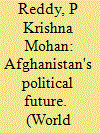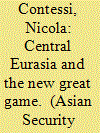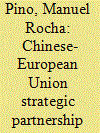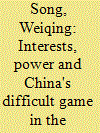|
|
|
Sort Order |
|
|
|
Items / Page
|
|
|
|
|
|
|
| Srl | Item |
| 1 |
ID:
124837


|
|
|
|
|
| Publication |
2013.
|
| Summary/Abstract |
The relationship between Afghanistan and the Shanghai Cooperation Organization (SCO) is a relatively new area of research. This article discusses the interplay between Afghanistan, China and the SCO vis -vis the Bonn 2001 to Bonn 2011 conference. Afghanistan was granted observer status in 2012 in order to facilitate its integration in the wider region and lessen US- NATO influence in the country.
|
|
|
|
|
|
|
|
|
|
|
|
|
|
|
|
| 2 |
ID:
124876


|
|
|
|
|
| Publication |
2013.
|
| Summary/Abstract |
In the 20 years since independence from the former Soviet Union, the study of Eurasia in International Relations (IR) has received considerable impetus in both the academic and policy circles. Specialized news and analysis outlets have come online, research centers have multiplied within universities, and a variety of think tanks now host dedicated programs. In other words, this still relatively little-known region has glamour. Yet Eurasia remains difficult to situate as an object of study due to its distinctive hybridity: geographical, at the crossroads between Europe and Asia; cultural, Muslim Russianspeaking Turkic peoples with Asian traits and traditions; political, straddling Western and Asian institutional forms domestically, and contiguous to Europe, Asia, Russia, the Middle East, and Afghanistan internationally. Partly as a result of this hybridity, Eurasia is a somewhat elusive object of study. At a minimum, it comprises the two subregions on each shore of the Caspian basin: Central Asia to the east and the Caucasus to the west. Reflecting this elusiveness, Central Asian states (CAS) belong to the Asia-Pacific Regional Group at the United Nations; they are members of the Asian Development Bank and the Economic Commission for the Asia-Paci?c. At the same time, they are members of the Organization for Security and Cooperation in Europe (OSCE), the European Bank for Reconstruction and Development, and the Euro-Atlantic Partnership Council, a North Atlantic Treaty Organization (NATO) ancillary forum. But they also have distinctly Central Asian groupings, such as the Eurasian Development Bank, the UN-af?liated Central Asian Regional Information and Coordination Center, not to mention the Shanghai Cooperation Organization (SCO) and Collective Security Treaty Organization (CSTO). Similarly, the three Caucasian states share most of the same af?liations, except for belonging to the East European Regional Group at the UN
|
|
|
|
|
|
|
|
|
|
|
|
|
|
|
|
| 3 |
ID:
125448


|
|
|
|
|
| Publication |
2013.
|
| Summary/Abstract |
The people's republic of China and the European Union (EU) have designed different projects for their inclusion into the international system. However the contrast among the different meaning that each actor gives to concepts like sovereignty, global security, human right or multilateralism has not been an obstacle to establish cooperation nexuses.
|
|
|
|
|
|
|
|
|
|
|
|
|
|
|
|
| 4 |
ID:
127774


|
|
|
|
|
| Publication |
2014.
|
| Summary/Abstract |
The Shanghai Cooperation Organization (SCO)-an organization interpreted in various ways-officially announced that it intended to ensure regional security by countering international terrorism, ethnic separatism and religious extremism. This article discerns the motivations of the SCO members, arguing that they have their respective, albeit occasionally mutual, interests and priorities. There is generally asymmetry of interests-the principal reason why the SCO's strategic situation is largely a suasion game between China and the members-with China demonstrating a greater interest in the SCO; moreover, the power asymmetry between China and the Central Asian members and the power equality between China and Russia further complicates the situation. This sophisticated relationship implies that despite some measurable results, the SCO faces tremendous challenges in becoming a well-established regional organization.
|
|
|
|
|
|
|
|
|
|
|
|
|
|
|
|
| 5 |
ID:
127775


|
|
|
|
|
| Publication |
2014.
|
| Summary/Abstract |
This paper reviews the perceptions of the CA states (Kazakhstan, Kyrgyzstan, Tajikistan and Uzbekistan) towards the Shanghai Cooperation Organization (SCO) and conceptualises the CA states' motivations and concerns in engaging in cooperation within the SCO vis-à-vis China. The message that this paper aims to deliver is that, for the majority of the CA leadership and public, China within the SCO represents the CA states' 'other', with decolonising but increasingly dominating features. These perceptions of China in the CA region elucidate the ways in which China's involvement in Central Asia has a paradoxical and contradictory impact on the potential for the SCO to move beyond functionalism and towards the creation of a broader SCO identity. Consequently, the future of the SCO may be more limited than the West fears and Central Asia hopes.
|
|
|
|
|
|
|
|
|
|
|
|
|
|
|
|
| 6 |
ID:
125419


|
|
|
|
|
| Publication |
2013.
|
| Summary/Abstract |
How policymakers assess the long tern political intentions of their states advertises is a fundamental issues in international politics. The problem is particularly acute in situations when major powers for reasons of their own security decide to refrain from stating their ultimate intentions.
|
|
|
|
|
|
|
|
|
|
|
|
|
|
|
|
|
|
|
|
|